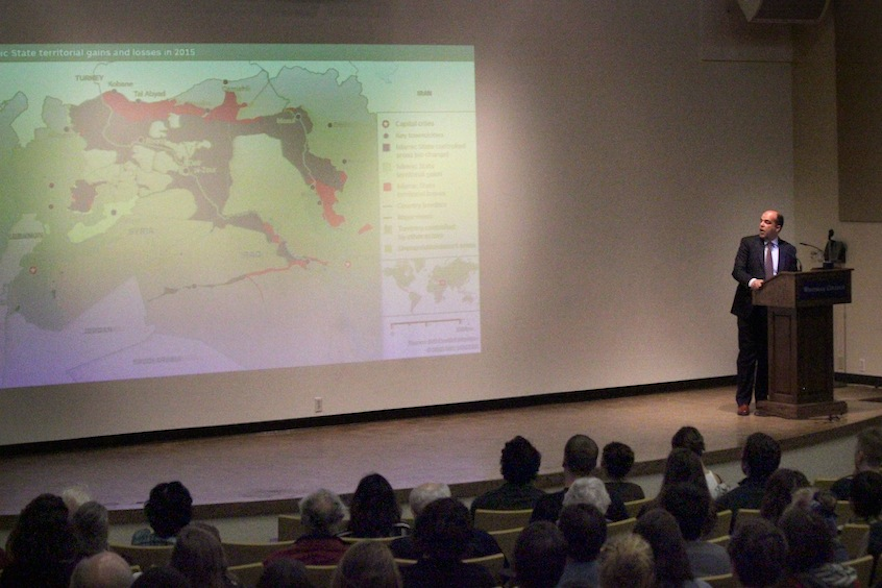Middle East scholar Mouin Rabbani draws high turnout with talk on ISIS
By Gillian Frew

Last week, independent analyst and researcher Mouin Rabbani, a frequent guest on CNN, the BBC and Al Jazeera and a specialist in contemporary Middle East studies, addressed a large crowd in Whitman's Maxey Auditorium. They had come to hear him speak on the origins of the self-proclaimed Islamic State (or ISIS), and the historical and political conditions that gave rise to the militant group now occupying parts of Syria and Iraq.
"When we look at this horrible phenomenon known as the Islamic State movement and project into the future, I think there are several clear lessons that we can learn from history," Rabbani said, referencing in particular the 2003 U.S. invasion of Iraq.
"I think the threshold for foreign intervention needs to be extremely high. Unless you come with a sound plan for the day after, don't intervene, because whatever problems you may be solving or think you may be solving, the likelihood is that you're going to create new ones."
His talk was especially timely in light of recent terrorist attacks in Belgium and Pakistan, as well as the recapture of the Syrian city Palmyra by government forces after almost a year of Islamic State control.
"Rabbani is a sharp mind, with decades of experience as a Middle East analyst," said Associate Professor of History and Director of Global Studies Elyse Semerdjian, who arranged to bring him to Whitman as an O'Donnell Visiting Educator. "He is really the most qualified to educate our community on the historical context to the rise of ISIS."
Samuel Brown, a history student at neighboring Walla Walla University who studied abroad in Beirut, attended the event after finding out about it from his department director.
He called Rabbani's nuanced take on the region "refreshing" and said the presentation provided "information I never find in mainstream American media... The sort of information I'd expect to hear only from an academic or regional expert with years and years of experience in the Middle East."
Rabbani, who is based in Jordan, is a graduate of Tufts University and Georgetown University's Center for Contemporary Arab Studies. He has served as principal political affairs officer with the Office of the UN Special Envoy for Syria and senior Middle East analyst and special advisor on Israel-Palestine with the International Crisis Group, a think tank whose reports are followed closely by analysts and educators focusing on conflict zones, including Semerdjian.
"Basically everything I read, this guy is on the board or writing for, making it a real pleasure to have him here," she said in her introduction.
In his talk, Rabbani made the case that the Islamic State is primarily a political, not a religious, enterprise. He argued that while its practices may seem medieval, the group's overarching mission must be understood "as a thoroughly modern interpretation and application of a faith whose imagined past is a projection backwards of contemporary agendas, rather than a revival of early Islamic rule."
As part of his two-day stay en route to a conference in Vancouver, B.C., Rabbani also led a workshop for Whitman students interested in NGOs: "Research, Analysis, and Report: The Nuts and Bolts of Writing an NGO Report."
"I signed up because the workshop seemed very unique," said Zoey Kapusinski '17. "I learned a lot about Hamas in the 2000s, coworker in-fighting, political opacity and the four main stages of NGO report writing."
Phuong Le '16 was curious about the inner workings of NGOs, and specifically Rabbani's experience with the International Crisis Group.
"Besides learning the major steps of seeking funding and writing a grant-worthy proposal, I also learned about how NGO research team members can work with each other, give honest peer-to-peer feedback and make sure they publish well thought-out research that is digestible for the target audience," she said. "This workshop was amazing, and I'm thankful that Professor Semerdjian worked relentlessly behind the scenes to organize it."
About 20 students participated in the two-and-a-half-hour workshop.
"I was extremely impressed by their interest in contemporary affairs, thirst for knowledge, and commitment," Rabbani said. "In a word, they struck me as serious."
Rabbani also praised the Whitman faculty, saying the college is lucky to retain professors "with such a diverse range of academic interests and geographical backgrounds, who are additionally—and most importantly—serious and committed educators."
He added, "In tumultuous times such as our own, the importance of global education is difficult to overstate, yet for a small college, particularly given its geographical location, Whitman nevertheless seems to have attracted the right people to provide such an education."